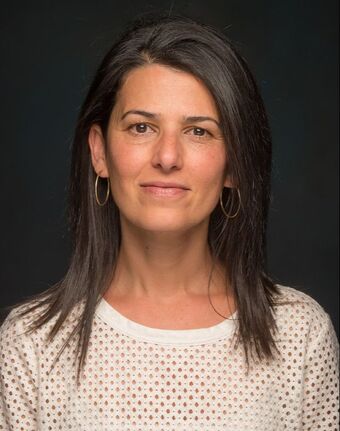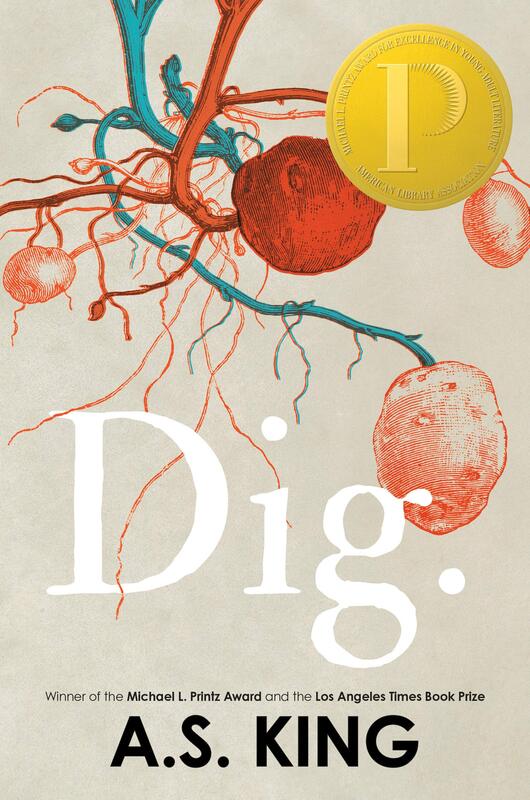Carlin Borsheim-Black, Professor of English Education at Central Michigan University, studies antiracist literature instruction, especially in predominantly white and rural communities, in her research and teaching.
Dr. Sarigianides and Dr. Borsheim-Black are co-authors of Letting Go of Literary Whiteness: Antiracist Literature Instruction for White Students, which has been nominated for a 2021 Grawemeyer Award in Education.
So we’re doing something a bit different for our blog contribution to YA Wednesday this round. Rather than share a plethora of texts to consider around a theme, we are drilling down--digging--into just this one text to share some insights about what we see King doing in this novel. Even folks who study racism, and whiteness in particular, might know to look for individual/interpersonal racism, institutional racism, or systemic racism. But because this book is written by A.S. King, it’s not easy to decipher what she’s doing about whiteness. So we took on the challenge of trying to figure it out for ourselves. We’re taking this approach to engage in the practice of walking a mile in our own skin, as white readers whose work focuses on critiquing whiteness, as one way to enact antiracist ELA through literature. We hope it’s helpful to other readers and teachers, too.
We don’t have the space to exhume all that King is doing around whiteness in this book, which integrally includes the kind of explicit, interpersonal racial violence exhibited by Jake and Bill, the murderous brothers. In this analysis, we are interested in the way she illuminates what white supremacy looks like in one white family. We want to dig around just a bit by tracing it out around the roots of the problem: the grandparents, Marla and Gottfried.
Deep in the novel, we learn Marla’s secret, something she hasn’t even told her husband because she is so ashamed of what it means about who she is. When she was a little girl, she needed a blood transfusion and there was a shortage of blood at the hospital, which was in the South. What the hospital meant was that there was a shortage of white blood; they did have blood from black donors, but they knew that most white patients would not take it. But Marla’s mother did take it to save her life. Only later, when she was a bit older, did Marla learn about this when she was getting teased about it by an uncle who called her a “half-blood.” Mortified, Marla vomited. To her, this information meant that she was “black,” and therefore, inferior to other whites. In Caste, Isabel Wilkerson calls this belief the fourth pillar of caste in the U.S.: purity versus pollution. The “one drop rule” seals in a caste system meant to construct black people at the bottom of the hierarchy, with whites on top, but only if the races keep apart, something that Marla’s blood transfusion violates.
In King’s hands, Marla’s disgust over herself, her own blood, her own racial identity as a “half-blood,” turns into a deep distance between herself and her husband, as well as a repulsion toward her own children. “As sure of it [their defectiveness] as she’s sure of how her body made defective children because of the blood. The damn blood.” (p. 363).
When your self-image is so deeply damaged, you seek any way to repair it. So when Marla learns that Gottfried has gone bankrupt, she shows zero understanding or compassion. She just tells him to fix it, by any means. So these racist roots start to affect more of the family.
Gottfried
To attempt a financial fix for his bankruptcy, Gottfried returns to work for his own family, a multi-generational potato farm that already included his father and his brother, a business he previously wanted nothing to do with. Despite the fact that joining the business is something his family is offering him as a way to help him out of his financial mess, right away, Gottfried proceeds to purposefully drive the business into the ground. When his father and brother realize the extent of the damage he has done to the business, the only solution is to sell the business and divide up the land, giving Gottfried, his brother and their father portions. It is the money from the sale of this land that Gottfried invests, that gets him and Marla their big home, as well as a beach home, and $10 million in the bank.
Again, in King’s hands, Gottfried’s “solution” to his personal financial troubles, is to engage in “any means necessary” to financially succeed, even if doing so ruins a family business and destroys his relationships with his brother and parents for the rest of his life. Capitalist greed proves to be a close cousin to white supremacy in ways that mirror the drives behind engaging in and maintaining slavery as an institution that founded and developed the United States economy. As Clint Smith discusses in his 2021 book, How the Word Is Passed, Thomas Jefferson, the man who served as President in the White House and who penned The Declaration of Independence, also owned hundreds of slaves whom he had beaten, whom he separated and sold, during his lifetime and presidency and even after his death, all to maintain his quality of life and to settle his debts. When the goal is money, compassion for others--family members or other people’s families--does not come into play. But, of course, Gottfried has no relationship with his own children, does not know all his grandchildren, and knows that he is directly responsible for their suffering since he is sitting on millions of dollars while his children suffer poverty, abuse, and severe health challenges all without any financial support from their millionaire parents. It is why Gottfried is haunted by the repetition of the robins that he accidentally ran over. Repeatedly, he remembers the two robins that he killed, only to have their image eventually become five robins in his mind, representing the five children that he has “run over” through abandonment and neglect, all rooted in racism and greed.
For A.S. King, when the roots of a family begin in racist beliefs of the “one drop rule”, those beliefs require a woman to drive her husband to succeed, financially, by any means necessary, even if those actions lead to the destruction of a thriving, multi-generational family business and the loss of any relationship with his family for the rest of his life. But even when you do this to succeed, it will never be enough to make up for believing that you are not worthy, that you have a “disease” as a secret “half-blood”, and so this belief starves your own children of the kind of love, connection and support that they would need to live fulfilling connected lives--which they do not.





 RSS Feed
RSS Feed